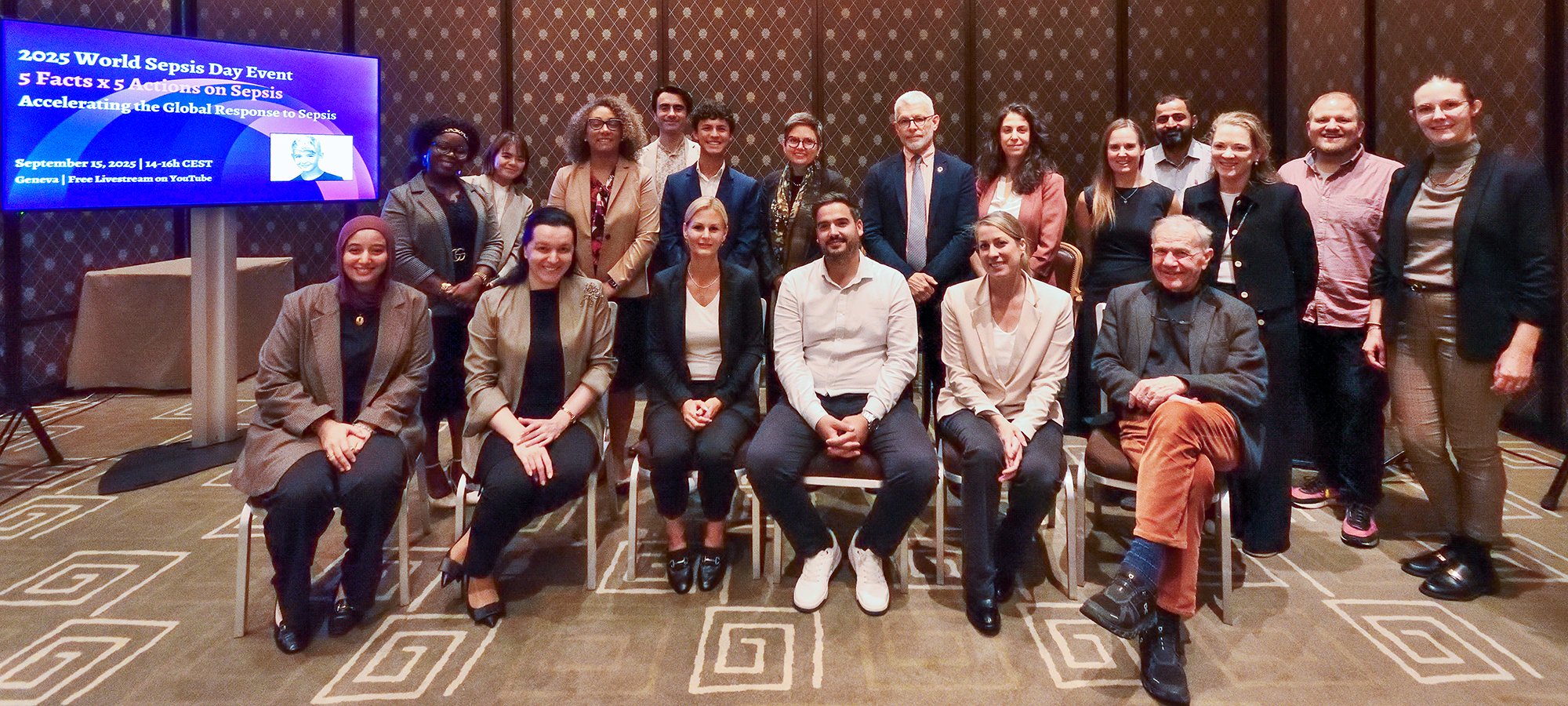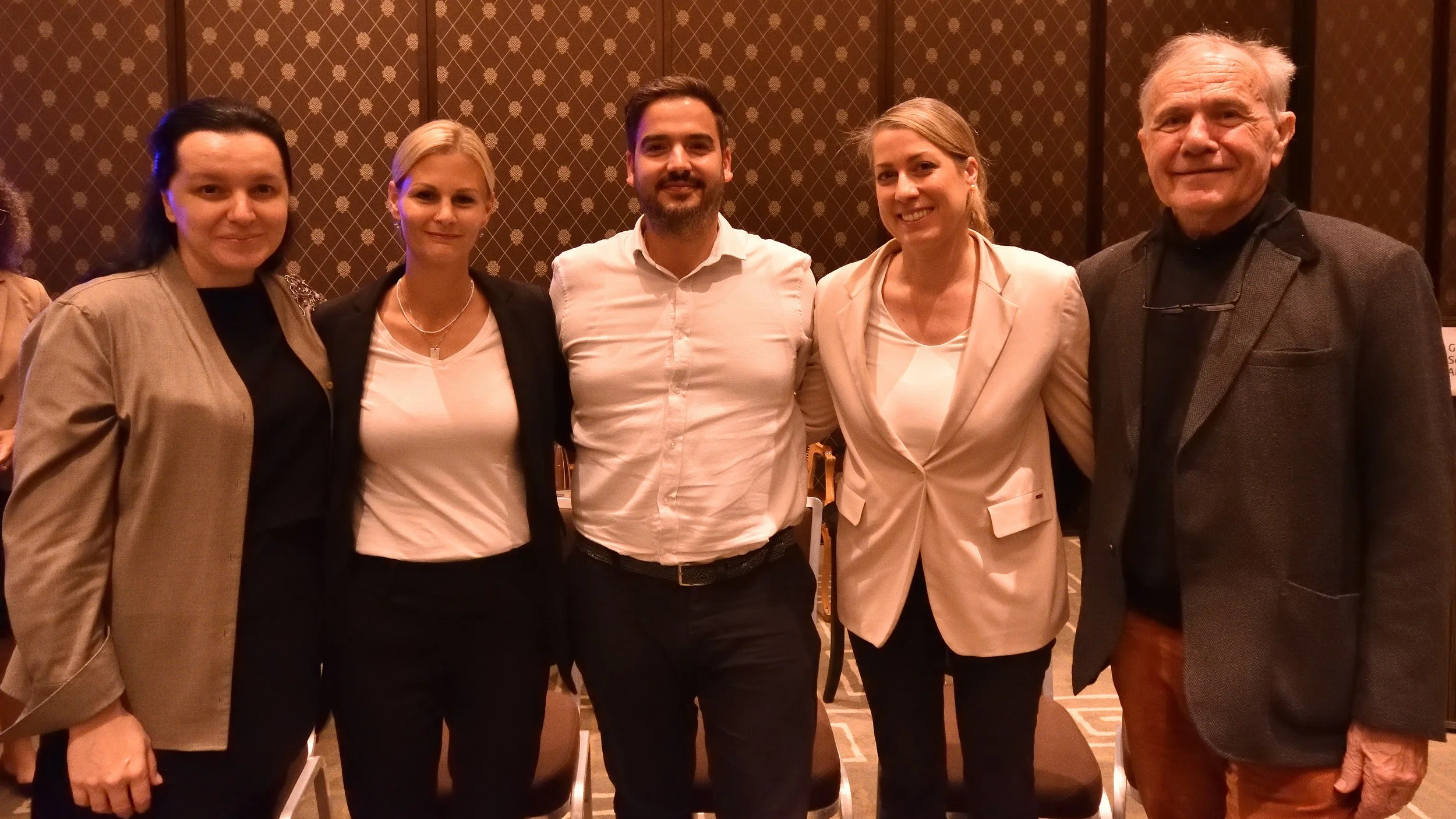On September 15, the GSA team met their passionate supporters, old and new stakeholders in Geneva, all gathered for the symposium “5 Facts × 5 Actions on Sepsis”. This powerful event, part of the 2025 World Sepsis Day campaign bearing the same name, stood not merely as another conference, but as a symbolic milestone, a powerful collective vow to make sepsis prevention and care a global health priority.
Dr. Mariam Jashi, CEO of the GSA, opened the gathering with gratitude for the continued support of Dr. Tedros Adhanom Ghebreyesus, Director-General of the WHO, who sent a heartfelt video address. He highlighted that half of all 50 million global sepsis cases occur in babies and children and that most deaths are preventable through infection control, early diagnosis, and timely treatment. “Nobody,” he said, “should die while seeking care.”
Dr. Yvan J-F. Hutin, Director, AMR Surveillance, Prevention & Control, at WHO, reaffirmed the organization’s commitment to integrating sepsis response into universal health coverage and antimicrobial resistance (AMR) strategies. His call for systemic integration underscored the day’s central message: sepsis is not a side issue, but rather a test of how health systems function.
Prof. Konrad Reinhart, Founding President of the Global Sepsis Alliance and President of the Sepsis Stiftung, citing data from the Institute for Health Metrics and Evaluation, revealed that more than 21 million people die from sepsis each year, with numbers having doubled during the COVID-19 pandemic due to viral sepsis. “Sepsis can strike anyone,” he warned, “but it disproportionately affects the poorest, particularly in low- and middle-income countries.” Tracing the historical fight against sepsis, he recalled how mortality has dropped thanks to vaccines, sanitation, and antibiotics, only to rise again even in HICs. “It’s not about resources,” he emphasized, “it’s about how health systems are organized.”
Reinhart compared data from Australia, Germany, and Switzerland, showing wide variation. He ended with both urgency and hope: “We already have the tools to prevent millions of deaths. What we need now is political will. Sepsis must be treated not only as a clinical issue but as a matter of global health justice.”
Prof. Niranjan ‘Tex’ Kissoon, President of the Global Sepsis Alliance, delivered a rousing message: “Sepsis is a global health threat hiding in plain sight, but we are not powerless.” He called for unity across sectors, policymakers, clinicians, survivors, and citizens, to turn awareness into action.
Prof. Evangelos Giamarellos-Bourboulis, Chair of the European Sepsis Alliance, shared sobering European data showing that many hospitals still lack standardized screening or management protocols. Yet, he also stressed that timely antibiotics and early recognition can save lives, as every hour of delay increases mortality risk.
Dr. Ricardo Baptista Leite, founder of the UNITE Parliamentarians Network, reminded delegates that sepsis is now entering the political agenda thanks to relentless advocacy. Legislators, he said, “must use every tool, policy, budget, and voice, to ensure national sepsis plans become law.”
Dr. Jashi reminded everyone that behind numbers there are faces. The face of the Geneva event belonged to Elia Epifanio, a bright 14-year-old Swiss go-kart racer, who died from septic shock after a late diagnosis. The grief of his parents, Jennifer and Daniel, became activism through their foundation, Trofeo Elia Epifanio.
Mariam Jashi, Jennifer and Daniel Epifanio, Nora Lüthi, and Konrad Reinhart
Jennifer’s speech was the day’s emotional core. She recounted how her healthy son deteriorated rapidly from infection to sepsis, undiagnosed until it was too late. Her message was simple and urgent: “Everyone should know the symptoms of sepsis.” Her courage turned personal loss into public awareness, reminding attendees why the mission matters.
Dr. Jashi responded with deep respect: “Each of the 11 million deaths from sepsis every year has a human face. Elia is that face today.”
The panel discussion, moderated by Katherine Urbáez, Founder and Executive Director of the Health Diplomacy Alliance, sought to unpack the five core facts about sepsis and define concrete strategies for placing it firmly on the global health agenda. Katherine highlighted that addressing sepsis is central to its cross-cutting agenda, given the high burden of disease and the need to mobilize both awareness and political funding. The experts proposed solutions ranging from policy integration to grassroots digital advocacy.
Dr. Teri Reynolds, Unit Head of the Department Performance and Financing and Delivery at WHO, focused on translating global sepsis advocacy into meaningful action at the community level, emphasizing that the alarming global death toll must be contextualized within the reality of individual communities. She stressed the necessity of integrating sepsis into existing policy mechanisms. Dr. Reynolds illustrated WHO’s tools helping countries integrate sepsis into basic healthcare services and inform decision-making. Furthermore, Dr. Reynolds noted the importance of the WHO's education initiatives, such as basic emergency and critical care courses, and providing simple, scalable process tools to improve outcomes without demanding additional costs.
Katherine Urbáez, Teri Reynolds, Cristoph Benn, Nora Lüthi, and Josué Laos
Addressing the underfunding of sepsis, Dr. Christoph Benn, Director for Global Health Diplomacy at the Joep Lange Institute, explored how to mobilize political commitment and financial resources. He suggested that politicians respond primarily to two factors: demonstrating urgency through the scale of the emergency, and presenting a "fairly simple solution to a complex problem". The primary challenge for the global sepsis fight, he argued, is developing a strong "investment case" and translating the problem into "communicable interventions". Dr. Benn strongly advocated for integration over establishing a separate fund, recommending leveraging existing funding streams, like the Global Fund or the World Bank, for strengthening UHC and overall health systems.
Dr. Nora Lüthi, Medical Program Manager, shared the practical insights from the Swiss Sepsis Program, which launched a National Action Plan (NAP) after recognizing a national deficit in standards, coordinated strategy, and quality programs before 2022. The NAP was enabled by the opportunity provided by a federal quality commission committing to five years of funding. However, she highlighted ongoing challenges, including the need for simple, multilingual messaging within a decentralized Swiss system. A key difficulty identified was the lack of a legal mandate for hospitals to adopt standards, which impacts the long-term program sustainability. Dr. Lüthi concluded that international cooperation and learning from the experiences of other countries is "pivotal".
Public health student Josué Laos defined the youth involvement as moving beyond mere representation to taking action in health and political spheres. He stressed that the current generation is keenly aware of the sepsis burden. Laos advocated for harnessing digital platforms such as TikTok, Instagram, and Facebook, noting that youth are creative, highly connected, and capable of moving masses of people. He argued that bringing the voice of families and survivors provides the human context to the data, which is crucial in a saturated information environment. Laos emphasized the youth's role as "conductors of information," bridging communication gaps and translating the message to their peers, making a youth-led involvement "very key" to the sepsis agenda.
Dr. Jashi outlined the facts at the base of the policy and media briefing prepared by GSA for this year’s World Sepsis Day campaign and urged all governments to make sepsis “the next success story in global health,” building on the 2030 Global Agenda for Sepsis, a landmark strategy developed with more than 70 partner organizations. Her closing echoed Dr. Tedros’s charge: “Nobody should die from sepsis.”















